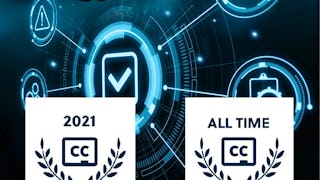Filter by
SubjectRequired
LanguageRequired
The language used throughout the course, in both instruction and assessments.
Learning ProductRequired
LevelRequired
DurationRequired
SkillsRequired
SubtitlesRequired
EducatorRequired
Explore the Process Control Course Catalog
 Status: Free Trial
Status: Free TrialSkills you'll gain: Project Management, Project Planning, Communication Planning, Project Documentation, Milestones (Project Management), Project Schedules, Risk Management, Cost Management, Budgeting, Estimation, Timelines, Procurement
 Status: Free Trial
Status: Free TrialVanderbilt University
Skills you'll gain: Prompt Engineering, ChatGPT, Productivity, Microsoft Power Automate/Flow, Calendar Management, Organizational Skills, Gmail, Generative AI, Artificial Intelligence, Large Language Modeling, HubSpot CRM, Business Process Automation, Google Sheets, Google Workspace, Data Integration, Automation, Creative Thinking, Ingenuity, Google Docs, Workflow Management
 Status: Free Trial
Status: Free TrialColumbia University
Skills you'll gain: Construction Estimating, Cost Estimation, Punch Work, Bidding, Cost Control, Project Closure, Lean Methodologies, Project Estimation, Cash Flow Forecasting, Request For Quotation (RFQ), Earned Value Management, Procurement, Request for Proposal, Change Orders, Building Information Modeling

The Hong Kong University of Science and Technology
Skills you'll gain: Audit Planning, Systems Development Life Cycle, Auditing, Compliance Auditing, Information Assurance, Risk Management, IT Management, Security Controls, Internal Controls, System Implementation, Change Management, Risk Analysis, Performance Review, Incident Management

Universidad Nacional Autónoma de México
Skills you'll gain: Nutrition and Diet, Clinical Nutrition, Personal Care, Preventative Care, Behavioral Health, Chronic Diseases, Public Health and Disease Prevention, Health Assessment, Patient Education And Counseling
 Status: Free Trial
Status: Free TrialSkills you'll gain: Threat Management, Cybersecurity, Risk Management Framework, Risk Management, Business Risk Management, Incident Response, Vulnerability Management, Security Information and Event Management (SIEM), Security Controls, Continuous Monitoring, Information Systems Security, Enterprise Security, Risk Analysis, Threat Detection, Information Assurance, Open Web Application Security Project (OWASP), Auditing
 Status: Free Trial
Status: Free TrialSkills you'll gain: Agile Software Development, Cloud Computing Architecture, Cloud Services, Agile Methodology, DevOps, Kanban Principles, Cloud Security, Cloud Technologies, Cloud Infrastructure, Cloud Platforms, Cloud Hosting, Cloud Engineering, Cloud Computing, Agile Project Management, Cloud-Native Computing, User Story, Sprint Retrospectives, CI/CD, Test Driven Development (TDD), Scrum (Software Development)
 Status: NewStatus: Free Trial
Status: NewStatus: Free TrialVanderbilt University
Skills you'll gain: Prompt Engineering, ChatGPT, Generative AI Agents, OpenAI, Productivity, Python Programming, Agentic systems, Artificial Intelligence and Machine Learning (AI/ML), Generative AI, Artificial Intelligence, Large Language Modeling, Creative Thinking, Ingenuity, Brainstorming, Software Development Tools, Application Development, Prototyping, Persona (User Experience), Business Logic, Automation
 Status: Free Trial
Status: Free TrialSkills you'll gain: Software Development Life Cycle, Software Architecture, Linux Commands, Bash (Scripting Language), Shell Script, Git (Version Control System), GitHub, Flask (Web Framework), Software Design, Unit Testing, Version Control, File Management, Jupyter, Scrum (Software Development), Application Development, Application Deployment, Python Programming, Data Structures, Collaborative Software, Web Scraping
 Status: Free Trial
Status: Free TrialSkills you'll gain: Stakeholder Engagement, Software Development Life Cycle, Software Architecture, Agile Software Development, Project Management Life Cycle, Resource Management, Risk Management, Peer Review, Earned Value Management, Stakeholder Management, Agile Methodology, Project Risk Management, Team Motivation, Software Design, Kanban Principles, Project Schedules, Information Technology, Sprint Retrospectives, Interviewing Skills, Project Management
 Status: Free Trial
Status: Free TrialSkills you'll gain: Data Storytelling, Interactive Data Visualization, Shiny (R Package), Data Wrangling, Exploratory Data Analysis, Relational Databases, Big Data, Data Visualization Software, Ggplot2, Database Design, Data Analysis, IBM Cognos Analytics, Statistical Analysis, Data Presentation, Data Mining, Dashboard, Excel Formulas, Data Manipulation, Web Scraping, Microsoft Excel
 Status: Free Trial
Status: Free TrialUniversity of Michigan
Skills you'll gain: Wireframing, Responsive Web Design, HTML and CSS, Web Content Accessibility Guidelines, Cascading Style Sheets (CSS), Web Design, Hypertext Markup Language (HTML), Browser Compatibility, Bootstrap (Front-End Framework), Javascript, Front-End Web Development, User Interface (UI), Web Development Tools, Verification And Validation, Interactive Design, Application Frameworks, Code Review, Web Design and Development, Event-Driven Programming, Usability
Process Control learners also search
In summary, here are 10 of our most popular process control courses
- Project Planning: Putting It All Together: Google
- ChatGPT + Zapier: AI-Powered Email Mastery: Vanderbilt University
- Construction Cost Estimating and Cost Control: Columbia University
- Information Systems Auditing, Controls and Assurance: The Hong Kong University of Science and Technology
- Nutrición y obesidad: control de sobrepeso: Universidad Nacional Autónoma de México
- Play It Safe: Manage Security Risks: Google
- DevOps, Cloud, and Agile Foundations: IBM
- AI Agents and Agentic AI in Python: Powered by Generative AI: Vanderbilt University
- Applied Software Engineering Fundamentals: IBM
- IBM IT Project Manager: IBM










